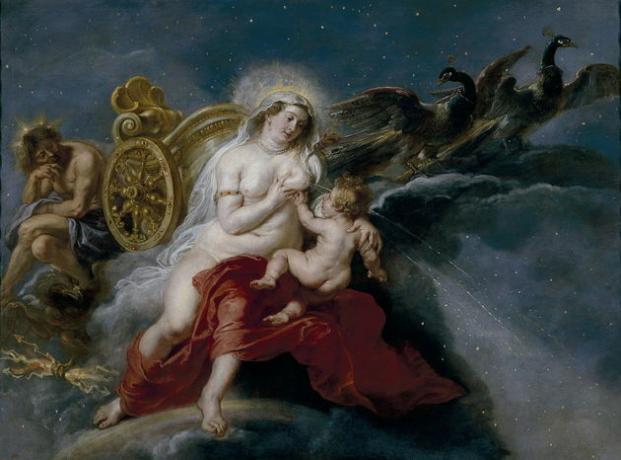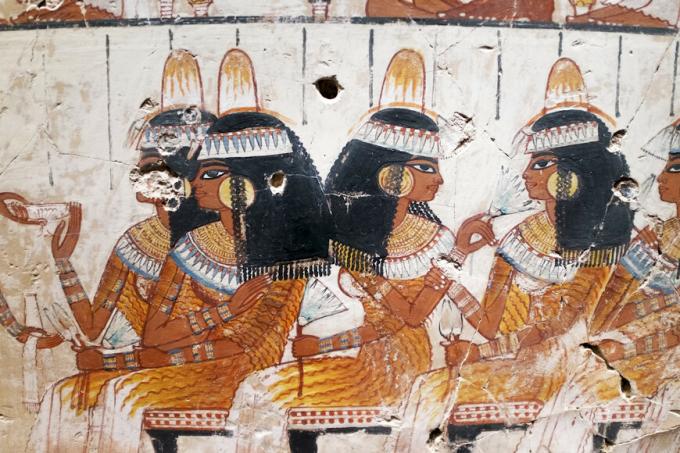Myths are fantastic stories, usually with supernatural figures such as gods or monsters, which serve to explain certain facts through metaphors and symbolism.
Legends, on the other hand, are accounts of historical events and people from ancient times. Therefore, they are based on a certain historical moment. However, these stories are distorted or exaggerated and given a fantastic air.
Although these words are commonly used interchangeably to refer to the fictitious nature of something, they have many differences.
| Legend | Myth | |
|---|---|---|
| Is there evidence? | Yes, but the evidence may be insubstantial. | No. |
| Historical context | It is based on some historical context. | It may originate from historical events, but it is not possible to identify them in the narrative. |
| fact or fiction | It is usually based on historical facts, which are distorted or exaggerated. | It may be inspired by a historical moment, but its content is purely fictional. |
| Characters | Notable people or events in history. | Gods, supernatural beings and realms, and heroes. |
| What is it about? | Mostly about heroics, but it can also be about evil. | It usually seeks to explain natural phenomena through symbolism and metaphors. |
| Meaning | The word “legend” derives from the Latin subtitle, which means “history” or “things to be read”. |
The word "myth" comes from the Greek word mythos, meaning "thought, story, or speech". |
| Example | The legend of Robin Hood or the legend of King Arthur. | The myth of Pandora's Box or the myth of the creation of the world. |
What are myths?

Myth is a type of symbolic narrative, which intends to explain certain phenomena through metaphors and symbolism.
Myths use invented characters, usually supernatural entities such as deities and demigods, and other fantastic elements. They often occur outside of conventional timelines.
Throughout history, myths have been used to explain apparently inexplicable phenomena or certain customs of some population. They are considered sacred and true, often reaffirmed by religious leaders and rulers.
Therefore, it was common for ancient myths to have been accepted as fact, as in the case of Greek and Roman gods. But over time, reason and science resulted in the downfall of many of these stories, which came to be seen as false, that is, mythical stories.
It is the myths that shape the mythologies that exist in each culture, as in the case of Greco-Roman, Nordic, Chinese, among others.
examples of myths
Myths are the stories that make up mythologies and serve to explain certain events. For example, in Greek mythology, the story of Pandora's Box is used to explain how evil and disease came to Earth.
Another well-known Greek myth is the story of Prometheus, who stole fire from Zeus to give to humans. A common contemporary myth is that black cats bring bad luck, which has no real evidence.
We can also bring examples of Brazilian folklore. Brazilian myths have fantastic figures such as Saci Pererê, Curupira, Boitatá, among many others.
What are legends?

Legends are stories that may include fantastic or superhuman elements, but are presumed to be based on historical facts and mention real people or events.
A historical fact becomes a legend when the truth is exaggerated, giving special characteristics to people or fantasizing events. For example, in them, historical figures may have superhuman or extraordinary qualities.
Additionally, real events may incorporate false elements, such as a sage or fortune teller warning a hero of future events.
Although the characteristics of people, particularly heroes, cannot be proven or are even false, legends still have some basis in truth. Therefore, they can be placed in a historical context.
examples of legends
A classic example of legend are the stories of Robin Hood. In the story, Robin is an outlaw known for stealing from the rich to give to the poor who would have lived in England during the 12th century.
Another example is the stories of King Arthur, which would have been based on a real British leader. Its existence, however, is still a matter of debate among historians.
Evidence about myths and legends
As myths tend to include supernatural elements in the very ancient past, there is no objective proof or evidence that the story happened.
Legends are stories based on real people or historical events. Therefore, they can be placed on a real timeline. They can be verified to some extent, but often have elements that cannot be proven.
See also the difference between:
- myth and philosophy
- history and history
- Popular culture and high culture


